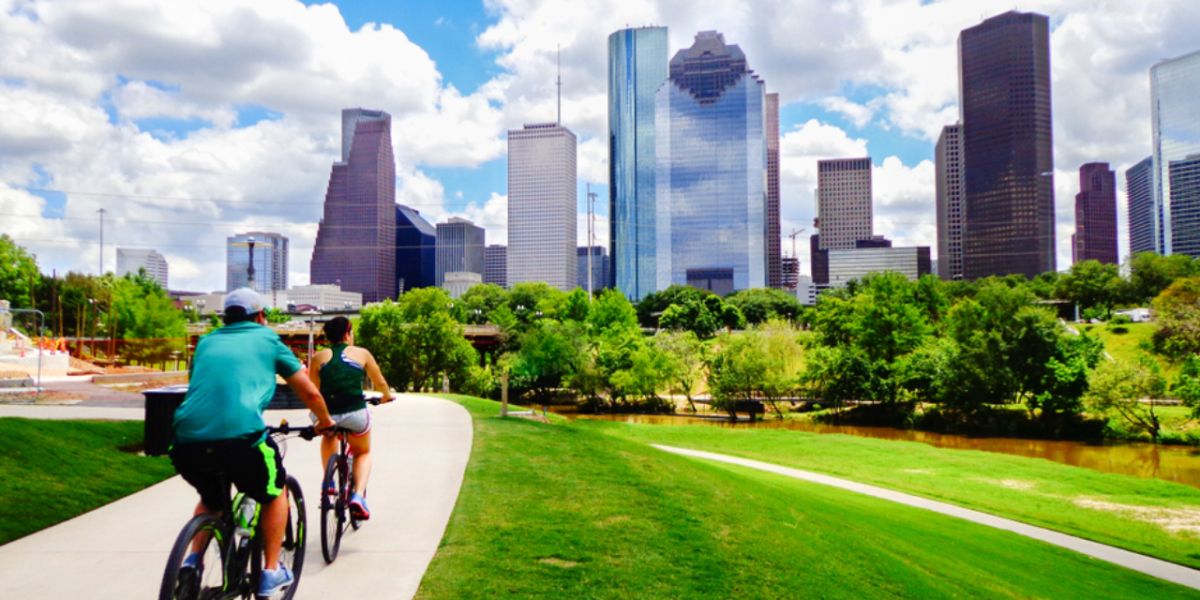
New York City and Los Angeles are often considered America's melting pots, but Houston should join them on that list. With a population of 2.3 million within the city limits and a wider metro area of 6.89 million in 2025, Houston continues to attract new residents due to job opportunities, diversity, and more affordable housing than many other major US cities. With many international businesses and a large expat population, there is a thriving multicultural community in Houston. If you can handle the threat of hurricanes and deal with urban sprawl, Houston might be the ideal city for you to set up in.
Overview of Houston
There are a few things house-hunting expats will want to keep in mind when searching for a place to live in the Houston area. Since Hurricane Harvey in 2017, Houston has made some major infrastructure and emergency preparedness improvements. However, extreme weather events are on the rise, and preparedness for hurricane season is essential. Foreigners moving to Houston should, therefore, check for flood risk and ensure properties are up to code.
Another thing to be aware of is Houston's urban sprawl. The city covers a massive 1,600 square kilometers (that's about 30 Manhattans). This means that owning a car and driving a lot is generally a big part of being a Houstonian. In saying that, public transport is improving but remains limited.
Where to live in Houston: Choosing your neighborhood
Central Houston is surrounded by Interstate 610, also known as 'the loop'. This term is an important and common reference for directions. For instance, the city's cultural institutions are located inside the loop, and many of the larger homes are outside the loop. To help you decide which is best for you, consider factors such as walkability, a good school district, and your budget. A few of Houston's most popular neighborhoods are listed below.
West University Place
Located near the Museum District, Rice University, and downtown Houston, West University Place occupies an inner loop position. This neighborhood is a favorite among young professionals and families seeking proximity to key city attractions. While it tends to be pricier, nearby Bellaire provides a similar ambiance with more budget-friendly housing options.
Eastwood
In the industrial East End of Houston, Eastwood offers moderately priced single-family homes. The recent addition of the Metro Rail connecting the area to downtown has boosted its popularity.
The Memorial Villages
Comprising six distinct communities, The Memorial Villages are extremely exclusive. Made up mainly of big homes near the downtown and within the sought-after Energy Corridor, this area is sophisticated.
Linkwood
Nestled on Houston's southwest side just beyond the loop, Linkwood comprises small-scale housing developments. This neighborhood is known for its strong sense of community.
The Woodlands
At the northern fringes of Houston lies The Woodlands, a sprawling community that could almost be considered a mini-city. Enclosing a blend of corporate campuses, shopping centers, and natural spaces, this is a popular option for families.
Other neighborhoods to consider are Pearland, League City, Afton Oaks, Bellaire, and The Heights. These neighborhoods are among Houston's most sought-after due to their central locations, excellent schools, and reasonable costs.
Accommodation prices in Houston
As in many urban areas, apartment sizes shrink, and costs rise as you approach the city center, a trend mirrored in Houston. The city's urban core primarily features apartments and townhomes, though single-family homes remain a viable choice.
Houston's average rent is about USD 1,475/month. One-bedroom units average around USD 1,200/month, two-bedroom units about USD 1,550/month, and three-bedroom single-family homes around USD 2,100/month. The median home price is USD 339,370.
Leasing a Houston apartment will generally include water, gas, trash services, and building upkeep. Most apartments still include these utilities, with total monthly utility bills typically ranging from $150 to $250, depending on usage and season.
Given Houston's hot and humid summers, air conditioning is generally included in most houses, which also come equipped with essential appliances like refrigerators and stoves/ovens. A minimum of one parking space is typically provided with most rentals.
Renting accommodation in Houston
Here are a few other things to consider when renting in Houston:
- Do a walk-through of the property: It's always a good idea to check the apartment/house you are about to rent firsthand. This way, you can see the state of the place, check for damage, and explore the neighborhood before making a long-term commitment. If you can't do the walk-through yourself, consider asking a friend or colleague for help.
- Inquire about the guest policy: Make sure to check if you can have long-term guests over at the property (partner, friends, family). It's also best to get these rules in writing to avoid possible future disputes.
- For student housing: review the guarantor clause. Students who sign a lease will often be asked to provide a guarantor — a person who will be liable for rent payments if said student can't fulfill rent obligations. Guarantors are typically parents — and it's important for them to review this clause before signing the lease;
- Get all the rules in writing: If renting the property has specific rules and regulations, it's best to ask the party you are renting from to provide these in writing. This way, you will have a reminder of what these regulations are, and there will be clear guidelines to follow in case of a dispute;
- Consult a professional: If you have more questions about your lease, it is best to get a professional opinion. Consulting a lawyer will help keep your tenant rights protected and make sure you are signing a legally accurate contract.
Life in Houston
Houston offers a year-round buffet of activities for expats, ranging from music and museums to sporting events and fine dining. Anchored by theatre and museum districts, the city is also famous for its eclectic live music scene. Sports enthusiasts will find their match in professional baseball (Astros), football (Texans), and basketball (Rockets) teams. Houston is also a gateway to Austin, Dallas, and New Orleans, all a manageable five-hour drive away, perfect for a quick escape or a road trip adventure.
Houston's arts and culture and events scene is growing with new mixed-use developments like GreenStreet and the Swift Building in The Heights, adding a dynamic new vibe to the city. Houston also remains one of the most diverse cities in the US, home to a large foreign-born and expat population.
The humid subtropical climate in Houston ensures mild fall, winter, and spring temperatures. However, the summer months (June to August) intensify with high heat and humidity. Expect average highs of 30–32°C and humidity surpassing 90%. The saving grace is air conditioning in most buildings, businesses, and restaurants.
Good to know:
Houston faces tropical storms and hurricanes, predominantly from July to October. Although not all storms cause major damage, preparedness is key. Emergency notifications are disseminated through all media channels, encompassing TV, radio, and SMS alerts to local numbers. For hurricane information and readiness, visit Ready.gov, a government resource that helps you prepare for storms.
Useful links:
We do our best to provide accurate and up to date information. However, if you have noticed any inaccuracies in this article, please let us know in the comments section below.








